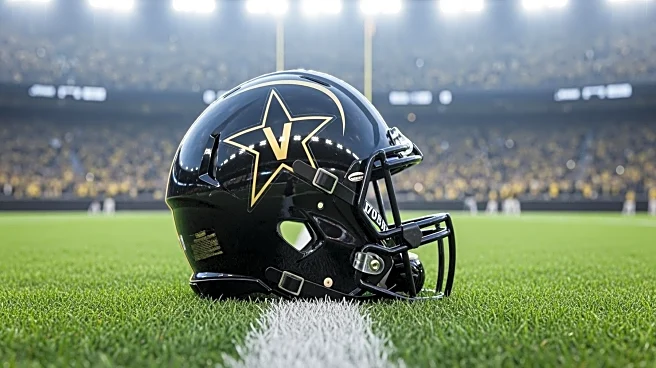What's Happening?
The Vanderbilt Commodores achieved a significant victory against the Missouri Tigers, winning 17-10 in a closely contested game. This win marks one of the biggest regular-season victories in Vanderbilt's program history. The game was decided by a late
defensive stand and a crucial touchdown run by quarterback Diego Pavia with less than two minutes remaining. Missouri's starting quarterback, Beau Pribula, suffered an injury in the second half, which impacted the Tigers' performance. Vanderbilt's victory has propelled them to a 7-1 record, positioning them as strong contenders for an unexpected playoff berth. The success of both Vanderbilt and Indiana, who are also performing exceptionally well this season, highlights the increased parity in college football, influenced by the NIL era where players receive compensation.
Why It's Important?
Vanderbilt's victory over Missouri is significant as it underscores the shifting dynamics in college football, where traditionally less dominant teams are emerging as strong contenders. The Commodores' potential playoff berth reflects the impact of the NIL era, which has contributed to greater parity among teams. This development could lead to a more competitive landscape in college football, challenging the dominance of historically powerful programs. The success of teams like Vanderbilt and Indiana may inspire other programs to leverage the opportunities presented by the NIL era, potentially altering recruitment strategies and team compositions. As Vanderbilt prepares to face Texas, their performance will be closely watched by stakeholders interested in the evolving competitive balance in college football.
What's Next?
Vanderbilt's upcoming game against Texas will be crucial in determining their playoff prospects. A victory could solidify their position as a playoff contender, while a loss might hinder their chances. The Commodores' performance will be scrutinized by analysts and fans alike, as they assess the team's ability to maintain their momentum. Additionally, the broader implications of the NIL era will continue to be a topic of discussion, as stakeholders evaluate its impact on team dynamics and competitive balance. The outcome of Vanderbilt's season could influence future policies and strategies related to player compensation and recruitment in college football.
Beyond the Headlines
The rise of teams like Vanderbilt and Indiana in the college football landscape may have long-term implications for the sport's structure and governance. As the NIL era progresses, there could be increased pressure on regulatory bodies to ensure fair competition and address disparities in resource allocation among programs. The evolving dynamics may also prompt discussions on the ethical considerations of player compensation and its impact on amateurism in college sports. Furthermore, the success of these teams could lead to cultural shifts within the sport, as fans and stakeholders adjust to a new era of competitive balance and diversity in team success.
















